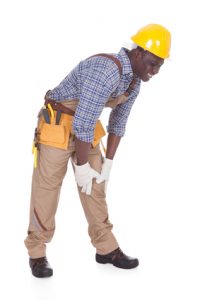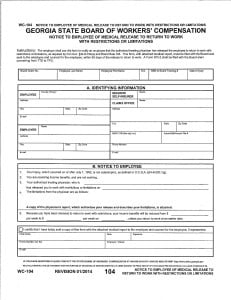Restrictions from a work injury often limit your ability to do your job. Back and arm injuries prevent you from lifting as much as you used to. Leg injuries prevent you from standing as long. Many people find that these restrictions prevent you from being as productive at work as they used to be.
Sometimes, your employer will terminate your employment after a work injury. They might let you go because you cannot do your job as well anymore (although they would be very unlikely to admit that). They may just say that they are laying people off because business is slow. They may fire you because they say you have violated company policy, broken a work rule, or accumulated too may points.
How does being terminated affect my workers’ compensation case?
If you are let go by your employer, there are two important things to understand
- A Georgia workers’ compensation injury does not prevent an employer from firing you.
- Being fired or laid off by your employer does not end your workers’ compensation case, but it can change your case somewhat.
Proving entitlement to benefits after being fired
If you still have problems from your injury that restrict your ability to work, you may be entitled to draw workers’ compensation benefits after you are fired or laid off. If you can prove that you were fired because of your workers’ compensation injury, then you should receive benefits. Cliff Perkins, the senior partner at our law firm, won the case of Padgett v. Waffle House, Inc. at the Georgia Supreme Court. That case decided that an injured worker was entitled to temporary total disability benefits if the job termination was because of the workers’ compensation injury.
Even if you cannot prove that your employer fired you because of your workers’ compensation injury, you may still be able to prove you are entitled to temporary total disability benefits. Your doctor may take you completely out of work. If that happens, you should start receiving benefits. Even if you can do restricted work, you can get benefits if you prove that you cannot find suitable work. The usual way of doing this is by trying to find a job. Even if you were not pursuing your workers’ compensation case, you would still be doing this anyway. If you cannot find a suitable job, you can request a hearing to try to get workers’ compensation benefits. A judge can award you benefits if you prove that the work restrictions from your injury prevented you from finding a job (or if you had to take a lower paying job because of your work restrictions).
How to get help
Proving that you were fired because of your injury or that you were unable to find another job because of your restrictions can be difficult. You will probably have to request a hearing. Most people have to get an attorney involved. Before you hire an attorney, it is a good idea to get a free consultation. You can set up a free consultation with one of our workers’ compensation attorneys by calling the phone number at the right of this page or completing the “Need Help” form.









